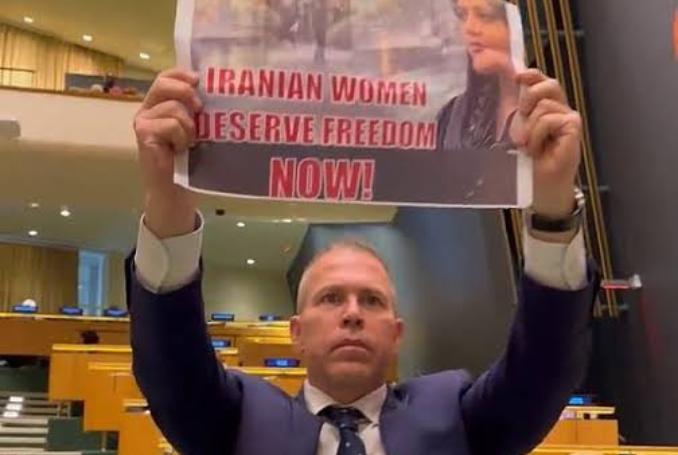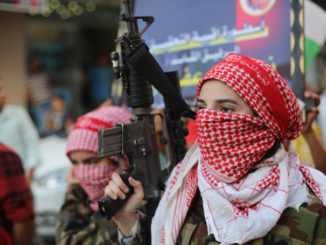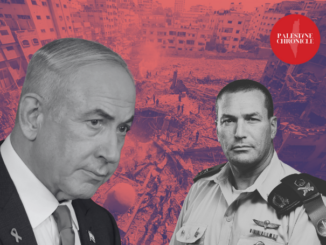
By Ramzy Baroud 
A defender of war crimes, like Gilad Erdan, must not be allowed to serve two roles: an apologist for the mistreatment of women in Palestine, and a freedom fighter for women anywhere else.
A new trend is emerging in the Israeli hasbara discourse targeting Palestinians, Arabs and Muslims: women’s rights.
The word ‘new’ is not exactly accurate. The misuse of the genuine struggle for women’s rights in the Arab and Muslim world is only new insofar as the increasing reliance on the tactic within the larger Israeli propaganda discourse.
This was demonstrated in a most bizarre way during the speech of Iranian President Ebrahim Raisi on September 19, at the 78th Session of the United Nations General Assembly in New York.
The story was orchestrated by Gilad Erdan, a mediocre Israeli diplomat and Tel Aviv’s UN Ambassador.
Erdan’s real strength comes from the fact that he is supported by the same Western governments that continue to fund and defend Israel’s war machine and military occupation of Palestine.
Naturally, he is also given a disproportionate amount of media coverage by corporate Western mainstream media, when compared to any other UN diplomat.
Erdan’s work is predicated mostly on a single tactic: If he is not pleased by the conduct of his peers at the UN General Assembly, he simply accuses them of being ‘anti-Semitic’, as a matter of course.
At times, the entire UN political body is accused of being anti-Israel and anti-Semitic.
This Israeli strategy – defaming truthsayers as anti-Semites – only succeeds because it is part of a massive political and intellectual discourse that is constantly fed by the media and accepted as a fact by Western politicians.
Indeed, if Erdan is judged as a diplomat, completely independent from the unquestionable support he receives from Western media and governments, he would have been forced to find another profession altogether.
His recent conduct at the UNGA was a perfect illustration. In a terribly choreographed gesture, he began walking up and down the Assembly Hall, raising a photo of Mahsa Amini, who died in Tehran last year. The placard said: “Iranian women deserve freedom now.”
Consistent with the rules of the UN, Erdan was eventually removed by security, which he must have anticipated.
For him, however, his charade was a success, as it created the needed distraction, not only from the speech of the Iranian President, but in the coverage of Raisi’s speech altogether.
Though some have suggested that Erdan had humiliated himself, namely because of his removal from the UNGA hall, I wonder if he was, in any way, surprised by the outcome of his behavior.
He wanted to be a star, at least for like-minded anti-Iranian governments and organizations; he wanted the conversation to shift from the rights of the Palestinians to that of Iranians. For him, the mission was accomplished.
Of the many articles and news coverage that followed Erdan’s display, a few, even in the Middle East, spoke about Israel’s war on Palestinian women: the killings, imprisonment, torture, denial of freedom of movement, daily humiliation, denial of life-saving medications, and much more.
According to the United Nations, at least 253 women were killed in Gaza in the 2014 war alone.
These numbers are only the tip of the iceberg, as every single Palestinian woman living under Israeli occupation, anywhere in East Jerusalem, the West Bank and Gaza suffers daily. These women are hardly removed from the collective struggle and suffering of all Palestinians.
Erdan had no signs prepared for those women; neither do many mainstream, supposedly feminist organizations that continue to rally in solidarity with Iranian women, while ignoring the pain and humiliation of Palestinian women at the hands of the Israeli military and government.
Sadly, little action followed a damning report issued by Israel’s rights organization, B’Tselem on September 5, where Palestinian women from the Ajlouni family were humiliated and paraded completely naked in front of their children. This episode took place while the Ajlouni’s boys and men were handcuffed and blindfolded, and while Israeli soldiers stole the women’s gold and money.
This is, of course, the norm, not the exception. It seems that whatever Israel does to Palestinian women, little action, aside from that organized by Palestinians and their supporters, ever follows: No placards at the UNGA, no US State Department-led campaigns, no unique hashtags, no mass protests, nothing of the sort.
When advocacy for human and women’s rights only applies in situations where the culprit is an enemy of the US, one must question if human rights have anything to do with the discussion altogether.
The irony is that Israel has been one of the main political forces behind the deadly US-Western sanctions imposed on Iran for years, which devastating Iranian society and families – women and men alike.
That, too, was another missing context from the coverage following Erdan’s UN act.
But Erdan is not alone. Sheltering behind women’s rights in the Middle East is now the go-to tactic in many public conversations, conferences and media coverage of Israel and Palestine.
Even if the tactic fails to strike a major shift in the perception of the Israeli occupation and apartheid in Palestine, at least, in the minds of some, it does create a distraction.
I have personally experienced this during many of my tours in various parts of the world, from Vancouver Canada, to Madrid, to Nairobi. Sadly, often well-intentioned people engage in the side discussion, either defending Middle Eastern societies, or nodding in agreement with the self-proclaimed women’s rights ‘activists’.
But Israel did not invent the ‘liberation of women’ as a strategy aimed at deflecting or justifying its own war crimes against civilians. The US used it as a backbone of its massive propaganda that preceded the Iraq and Afghanistan wars.
And, of course, once the invasions and subduing of these countries were completed, Iraqi and Afghani women disappeared from media coverage.
In both cases, tens of thousands of women were killed, raped and tortured by the US military. As for those ‘activists’ who had originally joined the initial US-championed women’s rights campaigns, they often disappear when women become victims of the US, the West and Israel.
While Arab and Muslim societies have their own social and political struggles, we must be wary not to allow Tel Aviv and Washington to hijack these struggles for their own politically sinister reasons.
It does not follow that, for women to be ‘freed’ from one society, the women of another society would have to live in perpetual bondage, of permanent occupation and racist apartheid.
This logic should apply to all situations of inequality, injustice, discrimination and racism, anywhere in the world.
And, a defender of war crimes, like Gilad Erdan, must not be allowed to serve two roles: an apologist for the mistreatment of women in Palestine, and a freedom fighter for women anywhere else.

– Ramzy Baroud is a journalist and the Editor of The Palestine Chronicle. He is the author of six books. His latest book, co-edited with Ilan Pappé, is “Our Vision for Liberation: Engaged Palestinian Leaders and Intellectuals Speak out”. Dr. Baroud is a Non-resident Senior Research Fellow at the Center for Islam and Global Affairs (CIGA). His website is www.ramzybaroud.net







